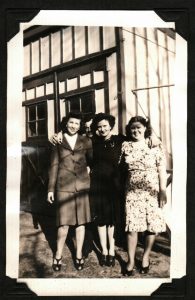
Being a professor, I always see summer as that amazing time of year when classes draw to a close and I finally pull out my latest bit of writing or research. Time to make good on my delayed promises, right? But along with a chance to be productive, summer is also a time of reconnecting with family and friends when those relationships struggle during the semester under the weight of papers, midterms, and finals. So it was great news when a grad school friend of mine from California (a former Minnesotan and now a Professor himself) visited the Midwest this past summer. Relishing in the reprieve that summer provides, he excitedly showed me the work he had begun on his family genealogy. He had many unsolved mysteries in the tree, but it was slowly coming together to form a picture of where his family came from. I had already become interested in both studies of memory and genealogy from another friend of mine, who excited told me stories of her family lines over the phone. Looking at his tree, and considering my own lack of knowledge of my own family, it dawned on me that this might be work worth doing.
There is a lot in common between the academic research I do in art history and visual culture and genealogical research. It is all about searching and sleuthing through old papers, documents, and photographs. There is also the thrill of discovery when you make a connection that was eluding you for weeks. As someone who teaches the history of photography as a component of some of my classes, I’ve begun looking at family photos in a new light, asking them new questions informed by my personal curiosity and my scholarly training as a purveyor of images.
The process has me thinking a lot about what theorist Roland Barthes said about photography in light of his mother’s death. He talks about her in the second part of his book Camera Lucida; a part that is usually overlooked for his famous quotes on photography in the first. But in light of her death, he starts examining photographs with searching eyes. I quote him at length here:
With regard to many of these photographs, it was History which separated me from them. Is History not simply that time when we were not born? I could read my nonexistence in the clothes my mother had worn before I can remember her. There is a kind of stupefaction in seeing a familiar being dressed differently…
Thus the life of someone whose existence has somewhat preceded our own encloses in its particularity the very tension of History, its division. History is hysterical: it is constituted only if we consider it, only if we look at it–and in order to look at it, we must be excluded from it. As a living soul, I am the very contrary of History, I am what belies it, destroys it for the sake of my own history… That is what the time when my mother was alive before me is–History…
And here the essential question first appeared: did I recognize her? According to these photographs, sometimes I recognized a region of her face, a certain relation of nose and forehead, the movement of her arms, her hands. I never recognized her except in fragments. Which is to say that I missed her being, and that therefore I missed her altogether. It was not she, and yet it was no one else. I would have recognized her among thousands of other women, yet I did not “find” her. I recognized her differently, not essentially. Photography thereby compelled me to perform a painful labor; straining towards the essence of her identity, I was struggling among images partially true, and therefore totally false.
Roland Barthes, Camera Lucida, pp. 64-66.
Barthes’ struggle to find his mother in the photographs she left behind is a process that genealogists–amateur and professional alike–understand. Because in truth we are all working in fragments. We are all trying to understand a History, or a time before we were. When we are looking into the lives of those who brought us into this world or raised us, the search can be tinged with curiosity, nostalgia, or even melancholic sadness. But as we go back in time to ancestors never met or never known, there is always that feeling of sifting through fragments for stories. A desire to know. Really know. It is a quest that motivates us, but one that also keeps us at arm’s length. I saw a photo of my grandmother on my mom’s side. And then a photo of my great grandmother on my dad’s side. I see myself in them, in parts of their faces, but I can’t know them. All I can do is search and weave together stories and perform the act of remembering. In a sense, I am destroying one history to write my own.
Christina M. Spiker, 2017